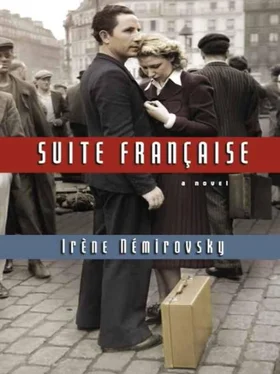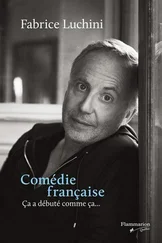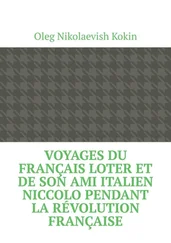"What a child!" Lucile thought. But she couldn't help smiling.
The officer continued, "It's a shame, isn't it, Bubi? You would love to make holes in the garden with your nose, I'm sure. If there were a small child in the house it would be different… He'd call us over. We've always got along well with small children… But here there are only two very serious ladies, very silent and… we're better off staying where we are, Bubi!"
He waited another moment and when Lucile said nothing, he seemed disappointed. He leaned further out of the window, saluted her and asked with excessive politeness, "Would it inconvenience you in any way, Madame, if I were to ask your permission to pick the strawberries in your flower beds?"
"Make yourself at home," said Lucile with bitter irony.
The officer saluted again. "I wouldn't take the liberty of asking you for myself, I assure you, but this dog loves strawberries. I would point out, as well, that it is a French dog. He was found in an abandoned village in Normandy, during a battle, and taken in by my comrades. You wouldn't refuse to give your strawberries to a fellow Frenchman."
"We must be idiots," thought Lucile. But all she said was, "Come, both of you, and pick whatever you like."
"Thank you, Madame," the officer exclaimed happily and immediately jumped out of the window, the dog following behind.
The two of them came up to Lucile; the German smiled. "I hope you don't mind me asking, Madame. Please do not think me rude. It's just that this garden, these cherry trees, it all seems like a little corner of paradise to a simple soldier."
"Did you spend the winter in France?" Lucile asked.
"Yes. In the north, confined to the barracks and the café by the bad weather. I was billeted with a poor young woman whose husband had been taken prisoner two weeks after they got married. Whenever she saw me in the hallway she started to cry. As for me, well, it made me feel like a criminal. Though it wasn't my fault… and I could have told her I was married too, and separated from my wife by the war."
"You're married?"
"Yes. Does that surprise you? Married four years. A soldier four years."
"But you're so young!"
"I'm twenty-four, Madame."
They fell silent. Lucile took up her embroidery. The officer knelt on the ground and began picking strawberries; he held them in the palm of his hand and let Bubi come and find them with his wet black nose.
"Do you live here alone with your mother?"
"She's my husband's mother; he's a prisoner of war. You can ask the cook for a plate for your strawberries."
"Oh, all right… Thank you, Madame."
After a moment he came back with a big blue plate and continued picking strawberries. He offered some to Lucile who took a few and then told him to have the others. He was standing in front of her, leaning against a cherry tree.
"Your house is beautiful, Madame."
The sky had become hazy, cloaked in a light mist, and in this softer light the house took on a pinkish ochre colour, like certain eggshells; as a child, Lucile had called them "brown eggs" and thought they tasted more delicious than the snow-white ones most of the hens laid. This memory made her smile. She looked at the house, its bluish slate roof, its sixteen windows with their shutters (carefully left only slightly ajar so the spring sunshine couldn't fade the tapestries), the great rusty clock over the entrance that no longer sounded the hour and whose glass cover mirrored the sky.
"You think it's beautiful?" she asked.
"One of Balzac's characters might live here. It must have been built by a wealthy provincial notary who retired to the countryside. I imagine him, at night, in my room, counting out his gold coins. He was a freethinker, but his wife went to first Mass every morning, the one whose bells I hear ringing on my way back from night manoeuvres. His wife would have been blonde, with a rosy complexion and a large cashmere shawl."
"I'll ask my mother-in-law who built this house," said Lucile. "My husband's parents were landowners, but in the nineteenth century there must have been notaries, lawyers and doctors, and before that farmers. I know there was a farm here a hundred and fifty years ago."
"You'll ask? You don't know? Doesn't it interest you, Madame?"
"I don't know," said Lucile, "but I can tell you about the house where I was born; I can tell you when it was built and by whom. I wasn't born here. I just live here."
"Where were you born?"
"Not far from here, but in another province. In a house in the woods… where the trees grow so close to the sitting room that in summer their shadows bathe everything in a green light, just like an aquarium."
"There are forests where I live," said the officer. "Very big forests. People hunt all day long." After thinking for a moment he added, "An aquarium, yes, you're right. The sitting-room windows are dark green and cloudy, like water. There are also lakes where we hunt wild duck."
"Will you be getting leave soon so you can go home?" asked Lucile.
Joy flashed across the officer's face. "I'm leaving in ten days, Madame, a week from Monday. Since the beginning of the war I've only had one short leave at Christmas, less than a week. Oh, Madame, we look forward to our leave so much! We count the days. We hope. And then we get there and we realise we don't speak the same language any more."
"Sometimes," murmured Lucile.
"Always."
"Are your parents still alive?"
"Yes. My mother will probably be sitting in the garden right now, like you, with a book and some embroidery."
"And your wife?"
"My wife," he said, "is waiting for me, or rather, she's waiting for someone who went away four years ago and who will never return… Absence is a very strange thing!"
"Yes," sighed Lucile.
And she thought of Gaston Angellier. There are some women who expect to welcome back the same man, and some who expect a different man from before, she said to herself. Both are disappointed. She forced herself to picture the husband she hadn't seen for a year, and what he must be like now, suffering, consumed with longing (but for his wife or his hatmaker in Dijon?). She wasn't being fair; he must be devastated by the humiliation of the defeat, the loss of so much wealth… Suddenly, the sight of the German was painful to her (no, not the German himself, but his uniform, that peculiar almond-green colour verging on grey, his jacket, his shiny bright boots). She pretended she had some work to do in the house and went inside. From her room she could see him walking up and down the narrow path between the large pear trees, their arms stretched out, heavy with blossom. What a beautiful day… Gradually the light began to fade, making the branches of the cherry trees look bluish and airy, like powder puffs. The dog walked quietly beside the officer, now and again rubbing his nose into the young man's hand. The officer stroked him gently each time. He wasn't wearing a hat: his silvery blond hair shone in the sunlight. Lucile saw him looking at the house.
"He's intelligent and well-mannered. But I'm glad he'll be leaving soon. It pains my poor mother-in-law to see him living in her son's room. Passionate souls are so simple," she thought. "She hates him and that's all there is to it. People who can love and hate openly, consistently, unreservedly, are so lucky. Meanwhile, here I am, on this beautiful day, confined to my bedroom because that gentleman wants to take a little walk. It's too ridiculous."
She closed the window, threw herself down on the bed and continued reading. She persevered until dinner time, but she was half asleep over her book, tired from the heat and bright light. When she entered the dining room her mother-in-law was already at her usual place opposite the empty chair where Gaston always sat. She was so pale and rigid, her eyes so raw from crying, that Lucile was frightened.
Читать дальше

![Константин Бальмонт - Константин Бальмонт и поэзия французского языка/Konstantin Balmont et la poésie de langue française [билингва ru-fr]](/books/60875/konstantin-balmont-konstantin-balmont-i-poeziya-francuzskogo-yazyka-konstantin-balmont-et-thumb.webp)










